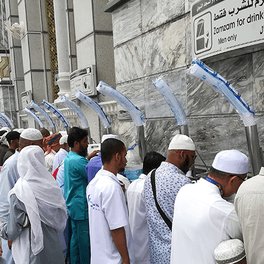Zamzam Water: Origin and Significance

Zamzam Water: Its Origin, Significance, and How to Drink It at the Kaaba
Origin of Zamzam Water
Zamzam water is a sacred and blessed water for Muslims around the world. Its source is the Zamzam Well, located just a few meters east of the Kaaba in the holy city of Mecca, Saudi Arabia.
According to Islamic tradition, the origin of Zamzam water dates back nearly 4,000 years. Prophet Ibrahim (Abraham), upon God's command, left his wife Hagar (Hājar) and their infant son Ishmael (Ismā‘īl) in the barren valley of Mecca. In search of water, Hagar ran seven times between the hills of Safa and Marwa. At that moment, the angel Jibril (Gabriel) appeared and struck the ground, causing water to gush forth beneath the baby’s feet. This spring was named Zamzam. The name is believed to have come from Hagar’s words “Zam zam,” meaning “Stop! Stop!” as she tried to contain the flowing water.
Unique Characteristics of Zamzam Water
Zamzam water is unique both spiritually and scientifically:
-
It has never dried up, despite serving millions of pilgrims every year for centuries.
-
It is pure and clean, free from harmful bacteria.
-
Rich in minerals, especially calcium, magnesium, and fluoride.
-
Clear and tasteless, with a naturally refreshing quality and no added treatment.
Religious and Spiritual Importance
Zamzam water is considered blessed and healing in Islam. Prophet Muhammad (peace be upon him) said:
“Zamzam water is for whatever it is drunk for.”
(Sunan Ibn Mājah, Book of Hajj, Hadith 78)
This means that Zamzam water brings benefit according to the drinker's intention—whether for physical healing, knowledge, sustenance, or spiritual upliftment.
How to Drink Zamzam Water at the Kaaba
Pilgrims who visit the Kaaba during Hajj or Umrah have the opportunity to drink Zamzam water directly from its source, which is now pumped and distributed through numerous taps and coolers inside the Masjid al-Haram.
Here’s how Muslims traditionally drink Zamzam water:
-
Make an intention (niyyah), such as seeking healing or blessings.
-
Say "Bismillah" (In the name of Allah).
-
Drink in three sips, following the Sunnah (Prophetic practice).
-
Face the Qibla (optional but encouraged).
-
Make a dua (supplication) after drinking. A common supplication is:
"O Allah, make it a source of beneficial knowledge, abundant provision, and healing from every disease."
Zamzam can be consumed in any amount—there is no fixed limit. Pilgrims are encouraged to drink until satisfied. It is reported that the Prophet (PBUH) once drank Zamzam to the point of full satisfaction, and even used it as nourishment.
Can You Take Zamzam Water Home?
Yes, pilgrims are allowed to take Zamzam water back home. The Saudi government provides official 5-liter sealed Zamzam bottles at the end of the pilgrimage. Commercial sale of Zamzam water is forbidden, so it is distributed only to returning pilgrims and their families.
Uses of Zamzam Water
-
Drinking for health, strength, or intention.
-
Giving to the sick for healing.
-
Used in religious ceremonies, including weddings and baby naming rituals.
-
Washing the face or hands for spiritual cleansing.
-
Sometimes used for ablution (wudu).
Five Interesting Facts About Zamzam Water
- Tests have proved that Zamzam water has 366mg/1 of bi-carbonates and that makes it the purest water on earth.
- The Zamzam well is 30 meters deep, out of which 13 meters is filled with compressed sediments and 17 meters comprise igneous rock. Through the hairline fractures of the rock, the water seeps on and gains its high mineral content beneficial for the humans.
- Zamzam water has no colour or smell but a distinct taste.
- Zamzam water is considered to have healing properties due to it having a high content of calcium and magnesium salts.
- It is considered that drinking Zamzam water increases the immunity of the body.
Conclusion
Zamzam water is not just any water; it is a gift from God, deeply rooted in Islamic history and tradition. Its spiritual value, coupled with its scientific purity, makes it one of the most revered waters on Earth. For those who visit the Kaaba, drinking Zamzam water is a moment of blessing and connection with centuries of faith.
Other Contents

